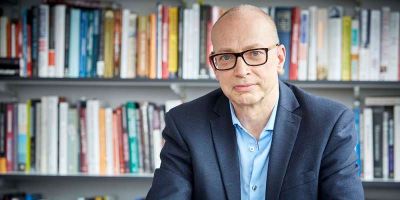Changing perspectives on disability

An online Disability Studies graduate who is now putting her learnings into practice at work recommends more people study the barriers faced by disabled people.
TV Development Executive Gillian Brown, who graduates this month from the University of Leeds, says that a change in attitude towards disabled people requires “allyship” and “the will to make change”.
Gillian, who spent the last year studying Disability Studies, Rights and Inclusion online, said: “I was lucky to be on this course and I really learnt a lot. There’s a big push in the industry I work in to be more inclusive, both behind the camera and in front of it.
“People are really scared of saying the wrong thing, but there’s no need for them to be. Education is the route to understanding.
“Those with a disability shouldn’t have the sole responsibility for educating everyone on behalf of all disabled people. The more non-disabled people who know the challenges, the barriers and how this can be overcome, and how to advocate that, the better.
“It’s allyship, really.”
“I’m finding that discussions about how we might include people and represent disability are naturally developing amongst my team at work because of what I’ve learnt.”
Gillian says modules such as those discussing how to design accessible spaces were particularly useful, and her knowledge is now cascading down to colleagues in her workplace at Strawberry Blond, where she develops factual TV shows.
“The course made me think about how we make TV programmes and will definitely inform me going forward – who we cast, how we film, where we film, what access there is.
“A lot of the stuff I learned will inform how I recruit, what questions I ask, what accessibility requirements there are. I think it’s completely changed my perspective.
“There are practical things you can do, but even just the questions you ask and the awareness you have, is important.
“I’m finding that discussions about how we might include people and represent disability are naturally developing amongst my team at work because of what I’ve learnt.”
Leeds has pioneered education in the field of Disability Studies since 1990 and is recognised as a global leader in the field. Its Centre for Disability Studies (led by the Faculty of Social Sciences) was the first University Centre in the UK to establish disability studies as an academic field of research and study.
The University of Leeds launched its groundbreaking online Disability Studies, Rights and Inclusion course last September, with students given access to world-leading teaching alongside like-minded learners in an accessible and inclusive global classroom. The course is taught by the School of Sociology and Social Policy and informed by the Centre for Disability Studies.
The aim of the course, which is available as an MSc or Postgraduate Diploma and Certificate, is to support students to recognise, understand and meet the challenges facing disabled people around the world. Students work to ensure that disabled people’s rights are respected, helping to build more inclusive and sustainable societies.
Understanding disability worldwide
Gillian graduates this month alongside Anna Linch, who applied for the course after her role at the National Portrait Gallery took on responsibilities for accessibility.
Anna, who is a teacher and has worked in the cultural sector for over 20 years said: "I had experience of championing disability, equality and inclusion in a variety of contexts, but had never undertaken formal studies in the subject. I wanted to take a step back and learn about the history of disability rights and understand the legal background to accessibility.
“This course ticked all the boxes in that grounding of understanding disability worldwide. There was a real global perspective to it, the cohort was international and the online learning aspect helped that.
“It was such a joy to be on the screen with people from around the world, having all these different perspectives, hearing stories from lived experiences and learning from each other."
Anna says one of the benefits of the course was that tutors helped learners to tailor the course topics with an angle specific to their interests.
“I think that’s one of the many strengths of the course. For each one of us, it was very personal learning,” she added.
Anna, who previously studied a Masters in Social History of Art at the University of Leeds, graduating in 1999, said: “I already had an affinity with Leeds, and the reputation of this course made it an easy choice.
“I couldn’t recommend this course more to others wanting to make a difference.”
Programme lead, Associate Professor of Social Policy and Disability Studies Dr Hannah Morgan said: “It’s fantastic to see that two of our students have gained so much from this course and will be sharing this knowledge onwards.
“Our global classrooms mean we can be flexible and accessible, and students can connect with professionals and activists across the world.”
Dr Margaret Korosec, Dean of Online and Digital Education at the University of Leeds, said: “This course is a unique opportunity for students from different professional backgrounds to come together, share ideas and build networks.
“As these two graduates show, even after studies are finished our courses still have real impact as people apply what they have gained from their experience at Leeds to make a difference in the world. It is exciting to celebrate our first graduates!”
The inaugural biennial Disability Studies Conference takes place from 3-5 September 2024 at the University of Leeds campus.
Further information
For further information, contact Corporate Communications Officer, Becky Pascoe




